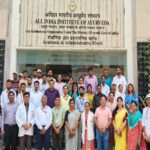The number of addiction cases have increased drastically in India
healthysoch
New Delhi, February 20, 2019 :
As per a recent survey conducted by the National Drug Dependence Treatment Centre (NDDTC) of the All India Institute of Medical Sciences (AIIMS), states including Uttar Pradesh, Andhra Pradesh, Punjab, Chhattisgarh, and Arunachal Pradesh have emerged as front runners in alcohol abuse and health complications due to the same. About 5.7 crore people in India suffer from alcohol-related problems and need treatment. Of the 16 crore who consume alcohol, the prevalence is 17 times higher among men.
Over 4 lakh children and 1.8 million adults need help for inhalant abuse and dependence, said the survey. The current use of Heroin is 1.14%, followed by pharmaceutical opioids (current use 0.96%), and opium (current use 0.52%). This was more prevalent in Uttar Pradesh, Punjab and Haryana.
Speaking about this, Padma Shri Awardee, Dr KK Aggarwal, President, HCFI, said, “Unlike activities like food, drinking, reading, music, which produce the optimum levels of dopamine, addictive substances or behaviors can release up to 10 times more dopamine. This leads to the “high” that is associated with use of drugs. Recurring activation of the “reward system” due to repeated use of addictive drugs leads to addiction. Drugs that modify dopamine affect motivation, motor functioning, sense of pleasure and important events experienced by a person. On the other hand, drugs that affect serotonin affect the ways how a person learns, remembers, sleeps and feels emotions.”
Addiction may worsen an underlying mental disorder or trigger a mental disorder such as attention-deficit hyperactivity disorder (ADHD), obsessive compulsive disorder (OCD), anxiety, depression etc. Such persons are more at risk of addictions.
Adding further, Dr Rajiv Garg, Sr Consultant Physician, said, “Reducing or stopping the consumption of alcohol is harm reduction. It can be the gateway to preventing other health complications later in life. Similarly, those who indulge in substance abuse should be counselled and provided with adequate help to be able to quit the habit.”
Some recommendations
- Put it in writing why you want to reduce or stop: Write what you want to achieve for example will feel healthier; will sleep better, will improve my relationships.
- Write confessions: learn and practice various confession exercises. This will help you take care of inner guilt which may be the precipitating factors.
- Set a drinking limit: Those who are cutting back should set a limit as per your health. Most healthy people should limit to less than 40 ml in one hour, 80 ml in one day and less than 240 ml in a week. Women should take less than half of this amount.
- Keep a diary of your drinking. For initial 3-4 weeks, keep track of every drink. Note the situations you are most likely to drink. Give each situation rating out of ten. Try avoiding those situations for the next few weeks.
- Don’t keep alcohol within your reach. Remove alcohol from your living place. This can help limit drinking.
- Eat your drink. Drinking slowly can help. Sip and do not gulp. Sip soda, water, or juice after each drink. This is called Mindfulness drinking. Be aware of your drinking will cut it down. Never drink on an empty stomach.
- Keep a weekly spiritual fast. This will allow alcohol-free days. Decide not to drink a day or two each week.
- Observe spiritual retreats: Observing spiritual retreats (Navratri by Hindus, Ramazan by Muslims, and Easter by Christians) with no drinking can help. Or try abstaining for a week or a month to see your commitment to not drinking.
- Last but not the least, be persistent in your efforts to quit.







